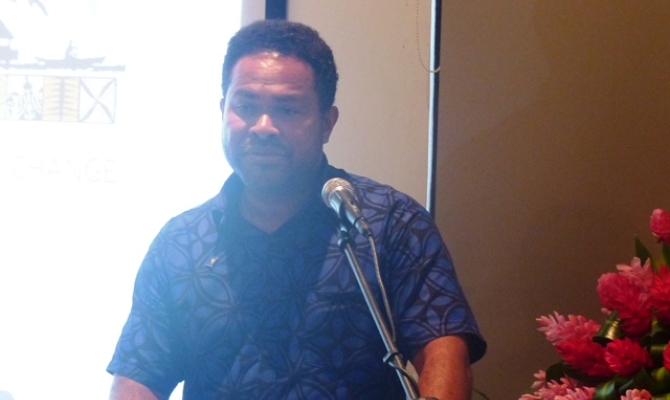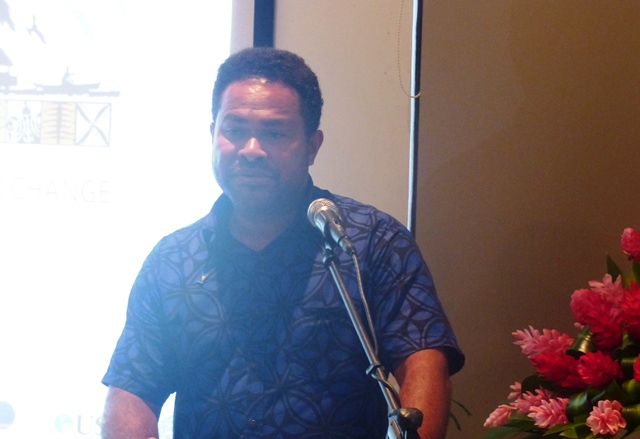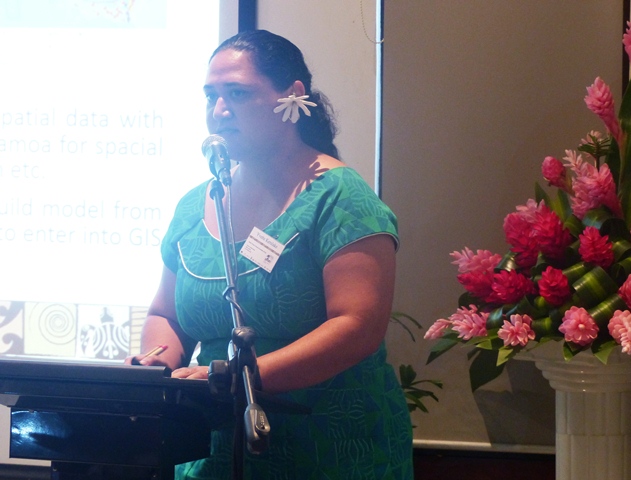
Climate Change Resilience
13 May 2015 Apia Samoa PCCR: The Pacific Island Framework Action for Climate Change endorsed by Pacific Island countries in 2005 required governments to encourage a strong enabling environment for achieving action on climate change, this was discussed through a panel at the Pacific Climate Change Roundtable being held in Apia, Samoa. Below is a quick snapshot from the different panelists.
Inoke Fotu Kupu of Tonga described how their government took a bottom-up approach to integrating climate change and disaster risk management into development planning. When they conducted community consultations, they were very surprised at the results. They underestimated the knowledge that communities had on climate change and how they wanted the government to assist them with their adaptation activities. From these consultations, they were able to develop groups, such as youth, women's committees, church groups, who were encouraged to develop their plans, which the government were able to incorporate into their national development plans.
Tokelau has attracted world-wide attention due to them being the first country in the world to have all electricity supply from 100% renewable energy. This project was fully driven by the community. While the funding came from the New Zealand government to purchase the 4000 panels required to supply 95% of their energy needs, the installation was completed by the community. Jolivisi Suveinakama of the Tokelau Office, said that the work started at 2am in the morning to avoid the heat of the day. While they still have challenges regarding the battery life of the solar panels, redesigning the relationship between community and government was the greatest benefit of this project.

Yvette Kerslake from Samoa shared how P3D tool assisted the Samoan government in involving the community in decision making and creating a two-way commitment between them in conserving the environment. Taking the ridge to reef approach, using spatial information and traditional knowledge, the stakeholders were able to create a model which allowed all parties to agree on projects. The water sector, forestry sector and the education sector and the community including the youth and disabled were involved in developing the models. The models fostered community ownership and have lead to the development of mangrove planting projects, and nurseries among other projects. The one-on-one engagement of government and community enables reflection on the past, a good look at the present and proposes new perspectives for the future sustainable development of resources in Samoa and the Pacific. Full presentation: http://bit.ly/1E6mkrW

The National Advisory Board of Vanuatu was developed to manage disaster risk reduction and climate change programs, projects and initiatives. Through strategic governance and policy, technical advice, project monitoring and coordination, finance procurement and administration, Florence Iautu of Vanuatu, said that they were able to establish mechanisms for project management, policy development, communication, and coordination. Some of the challenges they faced was the endorsement process, and trying to speak the same language. More awareness across the board is an issue they need to address.
For Palau, community engagement is what worked best in trying to develop a climate change policy for disaster resilient low carbon development. Synergising efforts with multiple partners became difficult in terms of communication and understanding roles and responsibilities. Xavier Matsutaro said that while they wanted an all inclusive approach, they had great difficulty in engaging the private sector. Careful selection of partners and consultants, and consistent communication between stakeholders is what will move projects forward in Palau.
Full presentation: http://bit.ly/1A0XJJT
The Pacific Climate Change Roundtable is held from 12 – 14 May in Apia, Samoa. The event in its current format has been coordinated by SPREP with guidance from a steering committee.
The PCCR has been made possible with support from the Government of Switzerland, Government of Samoa, Government of Australia, European Union, GIZ, United Nations Development Program (UNDP), Secretariat of the Pacific Community (SPC), Pacific Islands Forum Secretariat (PIFS), University of the South Pacific (USP) and the Pacific Council of Churches (PCC). Additional funding support was provided by the EU-GIZ Adapting to Climate Change and Sustainable Energy (ACSE) Programme, and Climate Analytics through its High Level Support Mechanism (HLSM) project as well as the United States Agency for International Development (USAID).. #pccr2015
Inoke Fotu Kupu of Tonga described how their government took a bottom-up approach to integrating climate change and disaster risk management into development planning. When they conducted community consultations, they were very surprised at the results. They underestimated the knowledge that communities had on climate change and how they wanted the government to assist them with their adaptation activities. From these consultations, they were able to develop groups, such as youth, women's committees, church groups, who were encouraged to develop their plans, which the government were able to incorporate into their national development plans.
Tokelau has attracted world-wide attention due to them being the first country in the world to have all electricity supply from 100% renewable energy. This project was fully driven by the community. While the funding came from the New Zealand government to purchase the 4000 panels required to supply 95% of their energy needs, the installation was completed by the community. Jolivisi Suveinakama of the Tokelau Office, said that the work started at 2am in the morning to avoid the heat of the day. While they still have challenges regarding the battery life of the solar panels, redesigning the relationship between community and government was the greatest benefit of this project.

The Pacific Climate Change Roundtable is held from 12 – 14 May in Apia, Samoa. The event has been held since 2008 on a biannual basis coordinated by SPREP in partnership with others and is coordinated by SPREP with the guidance from a steering committee.
The PCCR has been made possible with support from the Government of Switzerland, Government of Samoa,
Government of Australia, European Union, GIZ, United Nations Development Program (UNDP), Secretariat of the
Pacific Community (SPC), Pacific Islands Forum Secretariat (PIFS), University of the South Pacific (USP) and the Pacific Council of Churches (PCC).
Yvette Kerslake from Samoa shared how P3D tool assisted the Samoan government in involving the community in decision making and creating a two-way commitment between them in conserving the environment. Taking the ridge to reef approach, using spatial information and traditional knowledge, the stakeholders were able to create a model which allowed all parties to agree on projects. The water sector, forestry sector and the education sector and the community including the youth and disabled were involved in developing the models. The models fostered community ownership and have lead to the development of mangrove planting projects, and nurseries among other projects. The one-on-one engagement of government and community enables reflection on the past, a good look at the present and proposes new perspectives for the future sustainable development of resources in Samoa and the Pacific. Full presentation: http://bit.ly/1E6mkrW

The National Advisory Board of Vanuatu was developed to manage disaster risk reduction and climate change programs, projects and initiatives. Through strategic governance and policy, technical advice, project monitoring and coordination, finance procurement and administration, Florence Iautu of Vanuatu, said that they were able to establish mechanisms for project management, policy development, communication, and coordination. Some of the challenges they faced was the endorsement process, and trying to speak the same language. More awareness across the board is an issue they need to address.
For Palau, community engagement is what worked best in trying to develop a climate change policy for disaster resilient low carbon development. Synergising efforts with multiple partners became difficult in terms of communication and understanding roles and responsibilities. Xavier Matsutaro said that while they wanted an all inclusive approach, they had great difficulty in engaging the private sector. Careful selection of partners and consultants, and consistent communication between stakeholders is what will move projects forward in Palau.
Full presentation: http://bit.ly/1A0XJJT
The Pacific Climate Change Roundtable is held from 12 – 14 May in Apia, Samoa. The event in its current format has been coordinated by SPREP with guidance from a steering committee.
The PCCR has been made possible with support from the Government of Switzerland, Government of Samoa, Government of Australia, European Union, GIZ, United Nations Development Program (UNDP), Secretariat of the Pacific Community (SPC), Pacific Islands Forum Secretariat (PIFS), University of the South Pacific (USP) and the Pacific Council of Churches (PCC). Additional funding support was provided by the EU-GIZ Adapting to Climate Change and Sustainable Energy (ACSE) Programme, and Climate Analytics through its High Level Support Mechanism (HLSM) project as well as the United States Agency for International Development (USAID).. #pccr2015